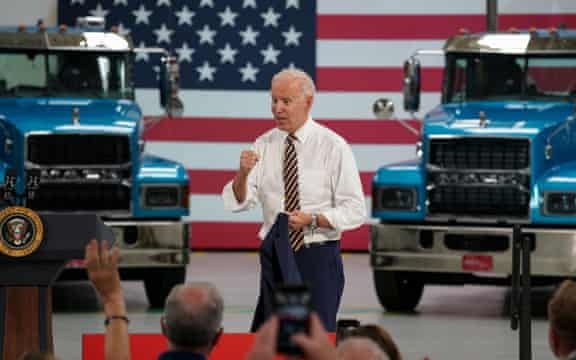President Joe Biden at a Mack Trucks factory in Pennsylvania, July 28, 2021 (Matt Smith/Rex/Shutterstock)
UPDATE, AUG 11:
The Senate has passed the $1 trillion Infrastructure and Investment Jobs Act by a 68-29 vote.
Nineteen Republicans, including Senate Minority Leader Mitch McConnell, voted Yes on Tuesday evening.
President Joe Biden praised the GOP senators for “a lot of courage” as he said from the White House, “This historic investment in infrastructure is what I believe you, the American people, want, what you’ve been asking for for a long, long time.”
McConnell, having modified his pledge to obstruct the Biden Administration’s legislation, said in a statement, “I was proud to support today’s historic bipartisan infrastructure deal and prove that both sides of the political aisle can still come together around common-sense solutions.”
The legislation may be delayed in the House. Speaker Nancy Pelosi and a majority of the Democratic Progressive Caucus, with almost 100 members, have said that a final vote will not take place until Senate passes the Biden Administration’s $3.5 trillion budget for social measures.
See also Biden Administration’s $3.5 Trillion Budget Unveiled in Senate
UPDATE, AUG 9:
The $1 trillion Infrastructure and Investment Jobs Act has cleared its last hurdle before a final vote in the Senate.
In a 68-29 vote on Sunday night, the chamber invoked cloture to limit debate. Democrats were joined by 18 Republicans, including Senate Minority Leader Mitch McConnell.
The final Senate vote is expected early Tuesday morning, after 30 hours for post-cloture debate expires.
UPDATE, AUG 8:
For the second time, the Biden Administration’s $1 trillion infrastructure bill has cleared an important Senate procedural vote.
Senators voted 67-27 on Saturday to break a filibuster and end debate.
Of 50 Republicans, 18 gave support. Sens. John Cornyn of Texas and Deb Fischer of Nebraska shifted to Yes for the first time.
The Bipartisan Infrastructure Deal is a historic, once-in-a-generation investment in our nation’s infrastructure. It will create good-paying, union jobs repairing our roads and bridges, replacing lead pipes, and building energy transmission lines.
We can’t afford not to do it.
— President Biden (@POTUS) August 7, 2021
Senate Majority Leader Chuck Schumer is hoping to complete passage before the August recess. He said on the floor of the chamber before Saturday’s vote:
We can get this done the easy way or the hard way. In either case, the Senate will stay in session until we finish our work. It’s up to my Republican colleagues how long it takes.
Senate Minority Leader Mitch McConnell reaffirmed his backing:
Republicans and Democrats have radically different visions these days, but both those visions include physical infrastructure that works for all of our citizens. The investments this bill will make are not just necessary; in many cases, they are overdue. Our country has real needs in this area.
Sen. Lisa Murkowski of Alaska, one of the 10-senator bipartisan group that worked with the White House on a compromise, added: “I’m really worried that everybody believes that we’re as dysfunctional as we appear to be, and so to prove otherwise, it’s kind of important. The Senate needs some demonstrated acts of bipartisanship.”
ORIGINAL ENTRY, JULY 29: The Senate advances a a $1 trillion infrastructure bill, raising the prospect of passage of what President Joe Biden calls “historic” legislation.
Senators voted 67-32 on Wednesday, with 17 Republicans joining Democrats to prevent a filibuster avoiding final consideration.
The bill, originally presented by Biden as the $2.3 trillion American Jobs Plan, is a compromise between the White House and a bipartisan group of 10 senators. The revised measure delivers $550 billion in new federal money for roads, bridges, rail, transit, water, broadband, and other infrastructure programs. It is the largest boost of federal support for the public works system since the 2008-2009 Great Recession.
There is $110 billion for roads, bridges and major projects; $66 billion for passenger and freight rail; $39 billion for public transit; $65 billion for broadband; $17 billion for ports and waterways; and $46 billion to help states and cities prepare for droughts, wildfires, flooding, and other consequences of climate change.
Its advance was assured after Senate Minority Leader Mitch McConnell, who has tried to block all major legislation by Democratic Presidents since 2010, backed the revision.
The bill now must be drafted formally and pass both the House, with its Democratic majority, and the Senate.
Biden said in a statement that the plan is “the most significant long-term investment in our infrastructure and competitiveness in nearly a century”.
Neither side got everything they wanted in this deal. But that’s what it means to compromise and forge consensus — the heart of democracy. As the deal goes to the entire Senate, there is still plenty of work ahead to bring this home. There will be disagreements to resolve and more compromise to forge along the way.
Democratic leaders had to give up some priorities to get the compromise. They included reduced new money for projects linking infrastructure and clean energy, although the revision provides for an expansion of transit programs. Funding must also be established after Republicans blocked additional tax enforcement by the Internal Revenue Service.

